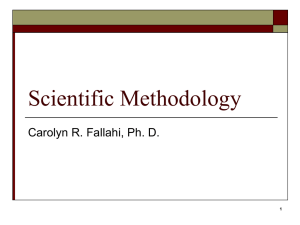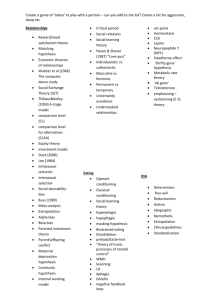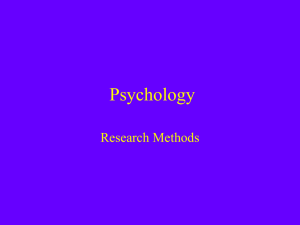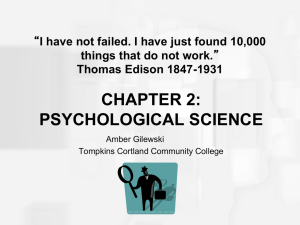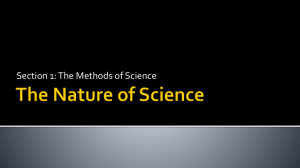Critical Thinking & Research Strategies
advertisement
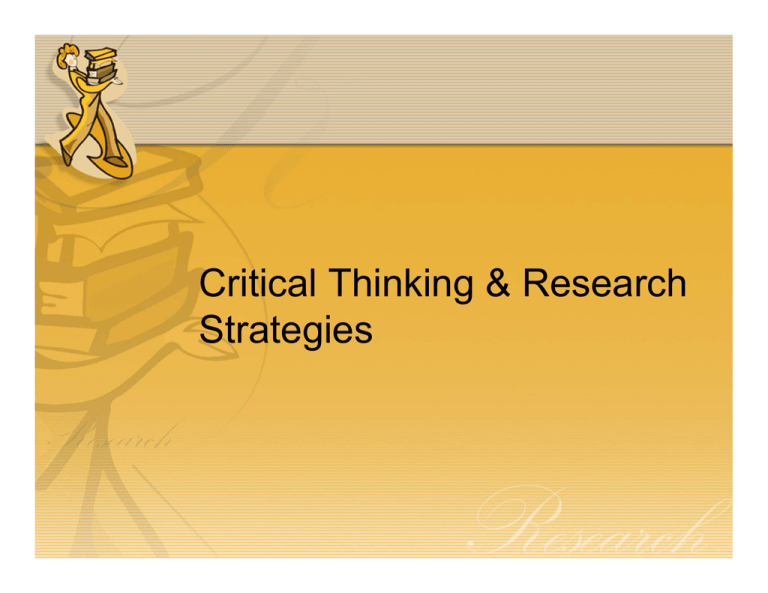
Critical Thinking & Research Strategies Outline • Critical Thinking • Research Strategies What is Research? Research: The methodical scientific investigation of a phenomena Research is also… • • • • • • Fun & Entertaining Enlightening Challenging Time Consuming Susceptible to error Something most psychologists engage in Why do psychological research? • • Purpose of Research: To differentiate between uniformed opinions and examined conclusions Leads to our understanding of how people feel, think, and act as they do Hindsight Bias • The “I-could-have-told-you-that” effect • There is always a common sense way to explain findings (hindsight bias) • Do “opposites attract” Or • Do “birds of a feather flock together” • Psychological research methods help us avoid the hindsight bias • I will provide a 3 number sequence based on a rule… • Your task: Guess my rule • My Sequence: 2, 4, 6 • Provide another 3 number sequence that will test my rule (Write it down) • When you think you have the rule I used figured out, raise your hand. Confirmation Bias • The tendency to search for information that confirms one’s preconceptions. • Looking only for confirming evidence ignores all other evidence Confirmation Bias • Some real world examples of confirmation bias… • People on welfare are lazy. • Bill Gates is greedy. • Women are bad drivers. • People are smarter than dolphins. • That person is attracted to me! Confirmation Bias • The tendency to search for information that confirms one’s preconceptions. • Looking only for confirming evidence ignores all other evidence • To be scientific you must try to find disconfirming evidence Critical Thinking • Prevents us from accepting arguments and conclusions blindly • Forces us to examine assumptions and evaluate evidence Critical Thinking, Cont. • Helps us to avoid hindsight bias, confirmation bias, & false uniqueness • Is an essential component of psychological research Critical Thinking Summary • What is research? • Purpose of research • Bias in research • Hindight Bias • Confirmation Bias • False Uniqueness • Critical thinking as a way to avoid bias in research How Psychologists Ask and Answer Questions Scientific Method Scientific Method What is the scientific method? • A recipe for conducting research • Progresses logically • Extends knowledge base • Used to create theories that organize, summarize, and simplify observations The Research Process (Scientific Method) Research Question Step 1: Establish a research question • We often begin with a general question Example: Is introversion related to intelligence? The Research Process (Scientific Method) Research Question Develop Theory Step 2: Develop a theory to answer your research question • Theory: General explanation of how variables relate to one another (an answer to our research question) Example: Introverted people are smarter than extroverted people. The Research Process (Scientific Method) Research Question Develop Theory Derive Hypothesis Step 3: Derive a hypothesis • A hypothesis is a more specific prediction of the relationships you expect to observe between the variables (if your theory is correct) Example: People who score higher on an introversion scale will score higher on a measure of intelligence Theory vs. Hypothesis • Theory • Broad • Large picture view • Unobservable constructs • Hypothesis • Specific • Specific prediction about what we expect to observe • Observable variables • Testable prediction that enables us to accept, reject, or revise the theory Theory vs. Hypothesis Theory 1. Drinking water reduces stress Hypothesis 1. People who drink at least 1 liter of water a day will have fewer headaches than people who drink less water. 2. Aggressive people engage in more moving traffic violations 2. People high on Winterrowd’s hostile aggression scale will receive more tickets for speeding. From Theories to Hypotheses • Operational Definition: Narrowly defines variables Theory Operational Definition • Drinks Excessively • Hard Worker • Is Aggressive • Is Intelligent • Reads a lot >5 drinks/nt for 5 nts/wk In office > 70 hrs/wk Scores above 57 on AQ Scores > 110 on WAIS Completes > 10 books/yr The Research Process (Scientific Method) Research Question Develop Theory Derive Hypothesis Step 3: Derive a hypothesis • A hypothesis is a more specific statement of the relationships you expect to observe between the variables (if your theory is correct) Example: People who score higher on an introversion scale will score higher on a measure of intelligence The Research Process (Scientific Method) Research Question Develop Theory Derive Hypothesis Design Research Step 4: Design the research • Figure out how we are going to collect data Example: Find scales (extroversion, intelligence), recruit participants, etc. The Research Process (Scientific Method) Research Question Develop Theory Derive Hypothesis Design Research Interpret Data Evaluate Data Collect Data Step 5: Collect Data Step 6: Evaluate data Step 7: Interpret data with respect to our theory The Research Process (Scientific Method) Research Question Develop Theory Derive Hypothesis Design Research Interpret Data Evaluate Data Collect Data Step 8: Loop! (replication) Summary so far… • Scientific method • Theory vs. Hypothesis • Operational definitions How Psychologists Ask and Answer Questions Methodology Methodology Outline • Naturalistic Observation • Survey • Case Study • Correlation • Experiment Naturalistic Observation Observing and recording behavior in the natural environment No attempt to control or manipulate the situation Survey A form of descriptive research used to examine a phenomenon Two common methods: questionnaires & interviews Case Study • One subject studied in depth to learn or discover universal principles Methodology: Correlation Correlation When one trait or behavior accompanies another, we say the two correlate. Correlational research: Examination of how scores on one variable relate to scores on another variable for the same group of people Example: Smoking and cancer Correlational Research • The relationship between variables (i.e., the correlation) can be described in terms of… • Direction • Positive relationship • Negative relationship • No relationship • Strength • Correlation coefficient (r) Correlational Research - Direction 30 • Positive Relationship • As one variable increases, so does the other variable 25 20 15 10 5 Ex. Height & weight 0 1 2 3 4 5 6 30 • Negative Relationship • As one variable increases, the other decreases 25 20 15 10 5 Ex. Self-esteem & depression 0 1 2 3 4 5 6 Correlational Research - Direction • No relationship • Changes in one variable are unrelated to changes in the other variable 25 20 15 10 5 0 1 Ex. Extroversion and emotional stability 2 3 4 5 6 Correlational Research ‐ Strength • Strength • Correlation coefficient (r) • Ranges from -1 to +1 Correlation coefficient Correlation Coefficient is a statistical measure of the relationship between two variables. Indicates strength of relationship (0.00 to 1.00) r = + 0.37 Indicates direction of relationship (positive or negative) Correlational Research Correlation does not equal Causation!!! Correlation and Causation Correlation does not mean causation! or Correlation and Causation Ice Cream Sales r = ++ r = ++ Murder Rate r = ++ Third Variable Methodology: Experiment Experiment • A method where researchers manipulate one or more variables to observe the effect • Often while other factors are controlled Advantage: Causality can be concluded Experimentation A summary of steps during experimentation. Independent Variable An independent variable (IV) is the factor manipulated by the experimenter Example: Breast feeding Dependent Variable A dependent variable (DV) is the factor measured in response to manipulation of the independent variable • Effect: Typically a behavior or a mental process Example: Intelligence Experimentation – Key Characteristics • Control Group • Group that serves as a comparison to allow for evaluation of treatment • Random Assignment • Assignment to condition by chance event • Height example - grades Experimentation A summary of steps during experimentation.
